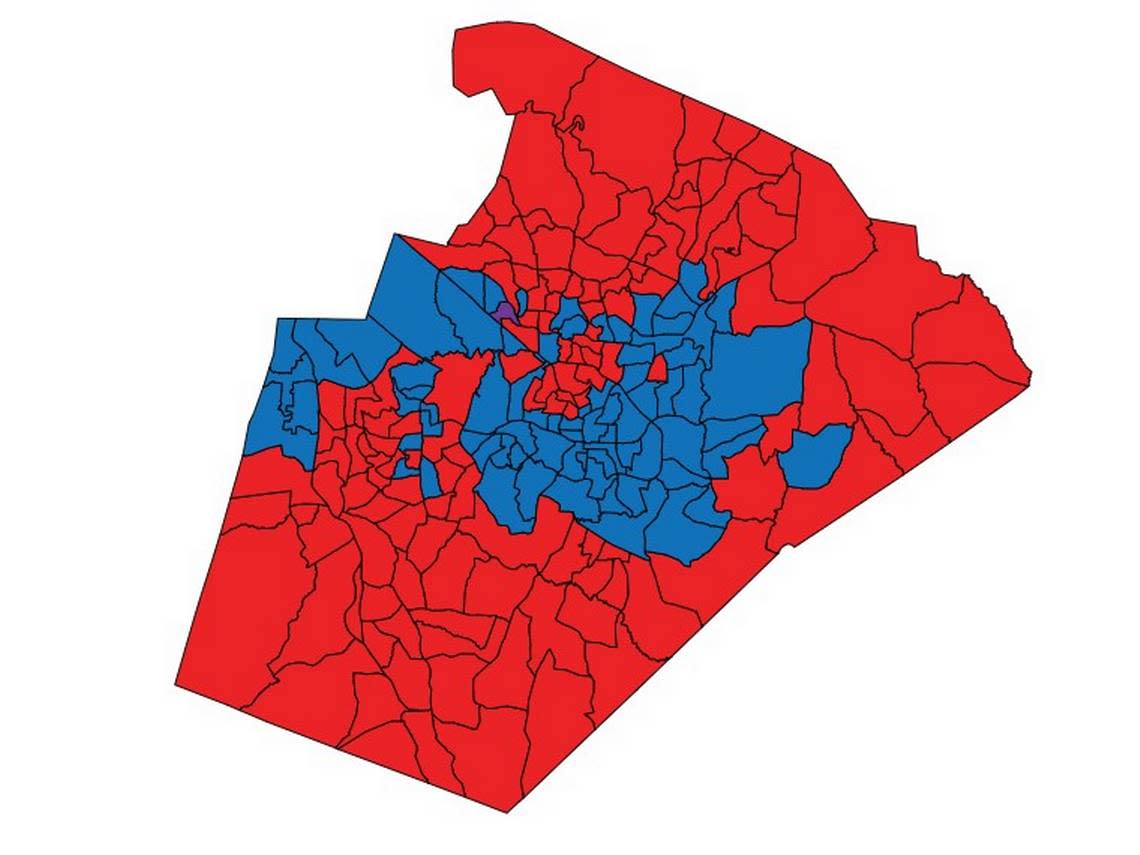Wake County has a new sheriff as Willie Rowe defeats Donnie Harrison
This year’s Wake County sheriff’s election presented a rematch of the 2014 race, pitting former sheriff Donnie Harrison against retired sheriff’s office major Willie Rowe.
This year had a different outcome.
Rowe, a Democrat, defeated Harrison, a Republican, with 53.5% of the votes, while Harrison took in 46.5%, according to unofficial results from all 208 precincts.
Rowe, 62, who retired from the Sheriff’s Office after 28 years, will succeed incumbent Gerald Baker, who will leave office on Dec. 1.
“We won this thing by word of mouth,” Rowe told a room of supporters at the Holiday Inn hotel in downtown Raleigh.
He spoke with his family beside him to a cheering crowd that yelled, “There’s a new sheriff in town!”
“We knew we couldn’t raise the kind of money that our opponent did, and we commend him for that, but we knew we would win it by word of mouth,” Rowe said.
Harrison’s campaign had roughly 15 times more cash available than Rowe heading into the race’s final months, The N&O reported previously. He had raised over $250,000 more than Rowe.
In 2014, Harrison defeated Rowe to win his fourth term. But Harrison, who was sheriff for 16 years from 2002 until 2018, lost to Baker four years ago.
Tuesday night, Harrison told The News & Observer that Rowe is a “good man” to take over the sheriff’s office.
“That’s politics,” Harrison said. “At least we got a good man to run the Sheriff’s Office. That’s something that we can lean back on. I said that to (Rowe) in the beginning, that either one of us will be able to run the Sheriff’s Office. I encourage Willie to work as hard as he can to this a safer Wake County.”
Rowe said the election was a “very uphill” battle when he unsuccessfully ran against Harrison in 2014, but this year was different.
“It’s really been about relationship building, and I think my proven work in the community and relationships I built across the county are paying off,” Rowe said.
New Wake sheriff’s platform
Rowe will inherit a Sheriff’s Office that has dealt with high turnover, jail understaffing and fewer deputies on the streets.
“Together we will bring gun safety, we will bring unity, we will bring leadership by example,” Rowe said in his victory speech. “We will bring the expectation of people (to do) their job and be held accountable ... the end of favoritism and opportunity for (officers) to advance, to be properly compensated and to be appreciated and valued for the work they put in. We’ll build a relationship with the community, build that public trust and close relationships for us to move forward.”
His campaign spoke to issues that resonated with Black and Latino voters, emphasizing racial equity and social justice, including opposition to the Sheriff’s Office’s collaboration with federal immigration law enforcement.
Rowe said one of his first orders of business will be addressing morale and current understaffing at the Sheriff’s Office.
When it comes to crime, Rowe said his strategy involves focusing on the “why” and not the “what.” He previously told The N&O about his plans to focus on crime prevention strategies through community engagement and work with at-risk youth.
His emphasis on community engagement was echoed by Harrison, except Rowe said he had been talking about it since his last run for sheriff.
“I wouldn’t have waited until now to talk about it. I brought these things up in 2014 and they weren’t addressed by him in ‘14 to ‘18, or before,” he said previously.
He has proposed working to reduce jail populations with pre-trial release programs and programs to work with formerly incarcerated people.

Central Wake voters backed Rowe
This spring, voters elected Rowe in the May Democratic primary and a July runoff against Baker, denying the incumbent a second term. He is the first sheriff in Wake County to lose re-election to a second term in decades.
Rowe told The N&O that he attributed his win to a “grassroots approach.”
The stronghold of support for Rowe was in central Wake, which holds the majority of the county’s population. This included much of Raleigh, according to a map of precinct results on the Board of Elections website.
Support from Rowe also came from voters in Cary and Morrisville, as well as in the towns of Garner and Knightdale.
But suburban and rural areas all around Wake overwhelmingly supported Harrison. These areas included towns in the northern, eastern and southern parts of the county.
The largest group of voters in Wake County, 41%, are unaffiliated, followed by registered Democrats at 36% and registered Republicans at 22%.






